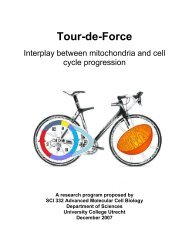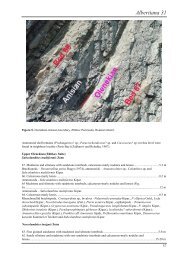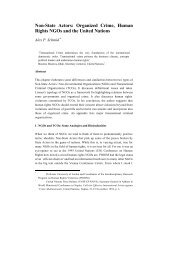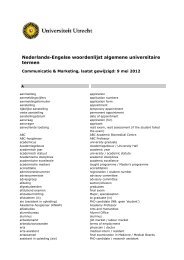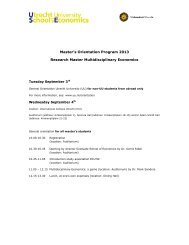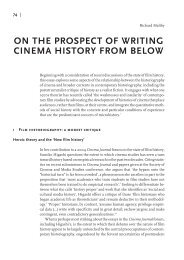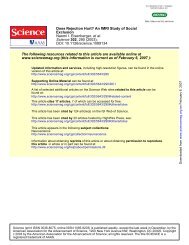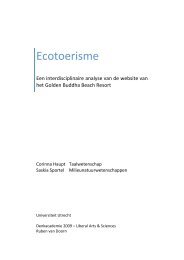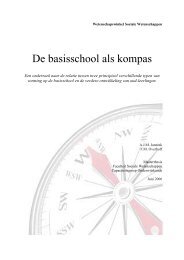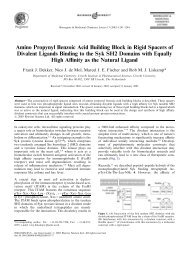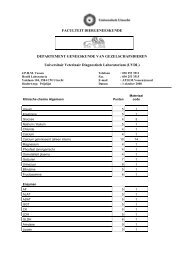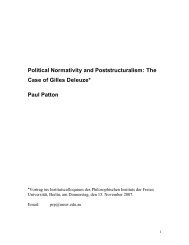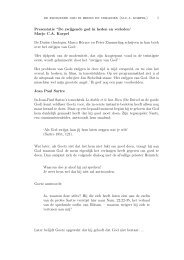Review of the Research Institute for History and - Universiteit Utrecht
Review of the Research Institute for History and - Universiteit Utrecht
Review of the Research Institute for History and - Universiteit Utrecht
You also want an ePaper? Increase the reach of your titles
YUMPU automatically turns print PDFs into web optimized ePapers that Google loves.
from <strong>Utrecht</strong> <strong>and</strong> Amsterdam. The database will collect <strong>and</strong> digitalise sources relating to cinema history<br />
be<strong>for</strong>e 1940 <strong>and</strong> make this accessible through <strong>the</strong> internet. It is expected that such digital databases will<br />
become increasingly important <strong>for</strong> fi lm studies. Thissen, Van der Velden <strong>and</strong> dr Karel Dibbets from <strong>the</strong><br />
University <strong>of</strong> Amsterdam are closely involved in <strong>the</strong> creation <strong>of</strong> an international network with similar aims.<br />
The fi eld <strong>of</strong> Media Studies in <strong>the</strong> Ne<strong>the</strong>rl<strong>and</strong>s is rapidly exp<strong>and</strong>ing, <strong>and</strong> attracts growing numbers <strong>of</strong> students.<br />
In such a new discipline qualifi ed faculty is scarce. To cope with this problem OGC <strong>and</strong> <strong>the</strong> programme leadership<br />
have decided in 2002 to appoint fi ve junior faculty with half-time research facilities, who can use that<br />
extra time to fi nish <strong>the</strong>ir PhD-<strong>the</strong>ses. International recruitment has helped to bring many faculty to <strong>Utrecht</strong><br />
from abroad. This has had <strong>the</strong> exciting side-effect <strong>of</strong> creating a mix <strong>of</strong> international scholars, from Australia,<br />
Belgium, Germany, <strong>and</strong> <strong>the</strong> US. This in turn has brought scholars from many o<strong>the</strong>r countries to <strong>Utrecht</strong>, to<br />
participate in such conferences as Visible Evidence in 2000, Level Up in 2003, <strong>and</strong> <strong>the</strong> Domitor conference<br />
on early cinema in 2004.<br />
A 4. Academic Reputation<br />
Since 1998, Media Studies has grown into a group in its own right, with a strong international pr<strong>of</strong>i le. Uricchio<br />
is one <strong>of</strong> <strong>the</strong> world’s leading experts on early German television, while De Leeuw is <strong>the</strong> acknowledged<br />
expert on early Dutch television. The inclusion <strong>of</strong> dr Andreas Fickers has provided <strong>the</strong> group with an expert<br />
on <strong>the</strong> history <strong>of</strong> media technology. Dr Joost Raessens <strong>and</strong> Marinka Copier MA have staked a claim <strong>for</strong><br />
<strong>Utrecht</strong> in <strong>the</strong> fi eld <strong>of</strong> computer games research by organizing <strong>the</strong> international conference Level Up (2003).<br />
Members <strong>of</strong> <strong>the</strong> group are on <strong>the</strong> editorial boards <strong>and</strong> editorial advisory boards <strong>of</strong> national <strong>and</strong> international<br />
scholarly journals, such as Tijdschrift voor Mediageschiedenis (Fickers, Hogenkamp, De Leeuw, Uricchio) Journal<br />
<strong>of</strong> Popular British Cinema (Hogenkamp), <strong>the</strong> internet journal E-view (dr Chiel Kattenbelt), Living Pictures<br />
(Kessler), Iris (Kessler), Montage/av (Kessler, Müller), <strong>and</strong> The International Journal <strong>of</strong> Cultural Studies (Uricchio).<br />
Uricchio combines his position in <strong>Utrecht</strong> with a full pr<strong>of</strong>essorship at MIT. Thissen <strong>and</strong> Van der Velden were<br />
visiting pr<strong>of</strong>essors at <strong>the</strong> UCLA <strong>History</strong> Department (2004), while Kessler is president <strong>of</strong> DOMITOR, <strong>the</strong><br />
International Association <strong>for</strong> <strong>Research</strong> on Early Cinema since 2003. The programme is successful in obtaining<br />
funding from NWO.<br />
A 5. External validation<br />
<strong>Research</strong>ers in this group collaborate with numerous non-academic individuals <strong>and</strong> organizations, such as<br />
<strong>the</strong> Raad voor Cultuur (Arts Council), in <strong>the</strong> fi eld <strong>of</strong> Media to help develop policies <strong>for</strong> <strong>the</strong> future. There are<br />
also many routine contacts with institutions such as <strong>the</strong> Filmmuseum in Amsterdam, <strong>the</strong> Instituut voor Beeld<br />
en Geluid (<strong>Institute</strong> <strong>for</strong> Vision <strong>and</strong> Sound), fi lm <strong>the</strong>atres, <strong>and</strong> fi lm festivals in <strong>the</strong> Ne<strong>the</strong>rl<strong>and</strong>s to develop<br />
interesting programmes.<br />
The European CHICAM project is coordinated by De Leeuw. This project combines ethnography with a<br />
socio-<strong>the</strong>oretical analysis <strong>of</strong> <strong>the</strong> role <strong>of</strong> media in <strong>the</strong> lives <strong>of</strong> migrants, <strong>and</strong> especially migrant children. This<br />
research was commissioned by <strong>the</strong> European Commission in Brussels. Hogenkamp’s chair was instituted by<br />
<strong>the</strong> <strong>Institute</strong> <strong>for</strong> Vision <strong>and</strong> Sound in 1998, <strong>and</strong> has been continued in 2003 <strong>for</strong> ano<strong>the</strong>r fi ve-year period.<br />
A 6. Internal evaluation <strong>and</strong> analysis: perspectives <strong>and</strong> expectations <strong>for</strong> <strong>the</strong> research programme<br />
1. Strengths<br />
This group has a broad orientation, <strong>and</strong> manages to combine a variety <strong>of</strong> approaches to Media Studies in a<br />
programme that is becoming increasingly more coherent. Particularly in early fi lm, <strong>the</strong>re is a strong focus<br />
<strong>and</strong> cohesion. The members <strong>of</strong> <strong>the</strong> group are generally young <strong>and</strong> represent various national backgrounds<br />
<strong>and</strong> intellectual traditions. The group has put itself, <strong>and</strong> <strong>Utrecht</strong> University, on <strong>the</strong> map by organizing several<br />
international conferences in <strong>the</strong> recent past. Members <strong>of</strong> this group are in regular contact with policy makers<br />
<strong>and</strong> collaborate with non-academic institutions <strong>and</strong> in <strong>the</strong> media sector itself.<br />
OGC The Cultural Construction <strong>of</strong> Media<br />
100



